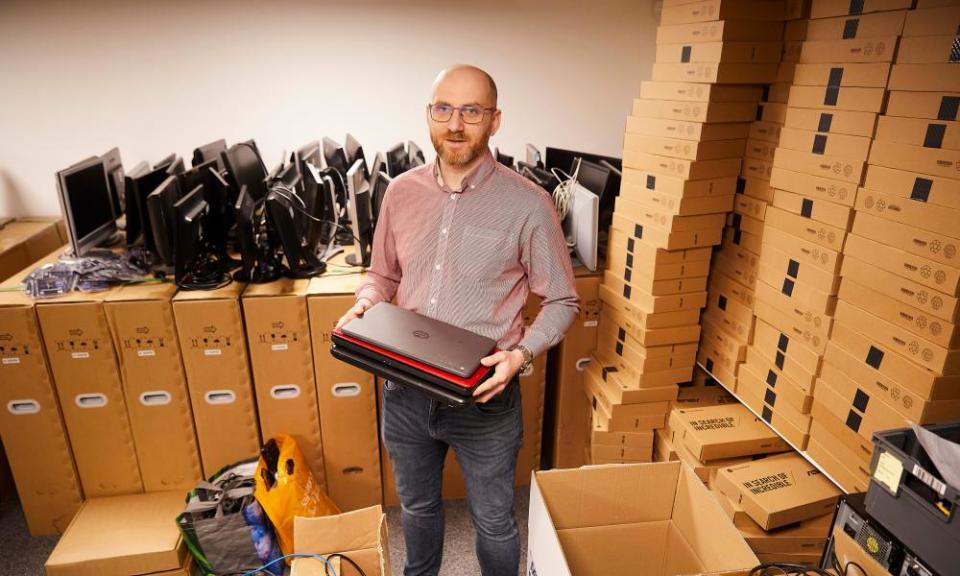'Transformational': Yorkshire firm cleans up donated laptops for pupils at home

“We wanted to level the playing field,” said Steven Lightfoot, of his project repairing hundreds of laptops and tablets and supplying them to children in Leeds who don’t have their own. “It’s about every person in the household having access to a device. My own kids want to continue learning while they’re at home. Some families are lucky enough to be able to do that, but some don’t have the option.”
Lightfoot, who has two school-age children and a toddler, is managing director of Pudsey Computers, a small IT repairs company located in a town of the same name between Leeds and Bradford. He and his team have mended and updated more than 450 devices donated by members of the community, in an attempt to provide each local child with access to an individual device on which to study while they are learning remotely. It works alongside a programme from the Department for Education (DfE) to distribute millions of laptops and tablets to children in England who need them.
The project began “pretty much” the night the third lockdown was announced in January, when schools had opened for a single day of term before being instructed to close again. Lightfoot was approached by a local city councillor who had a budget to support students who didn’t have adequate access to online learning and asked the firm what they could do.
After a social media campaign, the team of nine employees were inundated with offers of devices, testing more than 750 for eligibility before wiping and installing a new operating systems on those that were suitable, reduced from the usual price of £65 to £20 each. Once the devices are ready, they are given to local schools to be distributed to children who need them.
“They have often been sat in a drawer for a couple of years. We were never going to make them new, but we cleaned them and wrapped them up nice,” Lightfoot said.
In North Yorkshire, Dave Noble, the director of operations of the Red Kite learning trust, which runs 13 schools, heard about Pudsey Computers when one of the trust’s schools was offered devices.
“They were originally running a scheme just within the Pudsey area, where there are three high schools. It got me thinking, why just Pudsey? And it went from there. We’ve got a little service every week, collecting them from people and dropping them off in Pudsey,” said Noble.
The trust set up a JustGiving Page to fund the repairs and has so far raised nearly £5,000. They are hopeful that more local businesses might donate old laptops; a local legal firm recently donated 25 with an offer of another 50 to come.
“The DfE’s scheme [to buy devices for children] has been great, but we’re still around 400 short of our goal in devices,” he said. “We want one device per one learner. It’s been really positive in terms of the donations we’ve had, but there’s just not enough.”
So far, 22 of the refurbished devices have gone to Temple Learning academy in Leeds, one of the Red Kite schools, where a high proportion of students lack access to devices. The headteacher, Richard Hadfield, said it had been “transformational for families”.
“We might have a household where four siblings, in different age groups, are trying to use one device, which is not ideal,” Hadfield said. “People might think, it’s only 22. But that’s 22 households. It makes a huge difference.”
Heather Dean has received laptops for two of her children, aged eight and 13. “My kids definitely benefited a great deal. They were so happy. I didn’t tell them I was picking them [laptops] up, so it was a nice treat,” she said.
Prior to the laptops, Dean’s children were using worksheets and hard copies of online tasks, which the school dropped off at the start of each week before collecting them the following week.
“It looked overwhelming getting a full week’s worth of paper,” she said. “It was more difficult to get them to do individual learning tasks on paper … this is a lot more colourful and interactive. It also benefited them a lot learning to use the computer programmes.”
Using an app, Dean can monitor the work her children are doing, and when it’s due, and they can get more regular feedback, without having to wait until the worksheets are collected weekly.
“It’s really good, because when you’re doing it on paper you have a full week without direct contact,” she said.
But the problems don’t end with the devices. According to the Red Kite learning trust, there are still high rates of children in some areas of Leeds without access to stable wifi.
“We don’t know the full picture, but the local area doesn’t seem to be served by reliable wifi,” Hadfield said. “[At our school] 20% of homes have no internet at all, and 40% are using a mobile phone to work off.”
Related: Secondary schools ask for clarity from UK government on face masks
In Pudsey, it’s an issue Lightfoot has also seen. “We had an instance where a student on an apprenticeship didn’t haven’t any wifi at home, so they were sat on the bus for two hours because you get free wifi on the journey,” Lightfoot said. “You don’t necessarily think about that, but it’s a very real thing. This is what people are going through.”
As schools in the area prepare to reopen on 8 March, the pace of the project has slowed, with fewer donations arriving at the doors of Pudsey computers. But the impact, the schools hope, will be lasting.

 Yahoo Movies
Yahoo Movies 